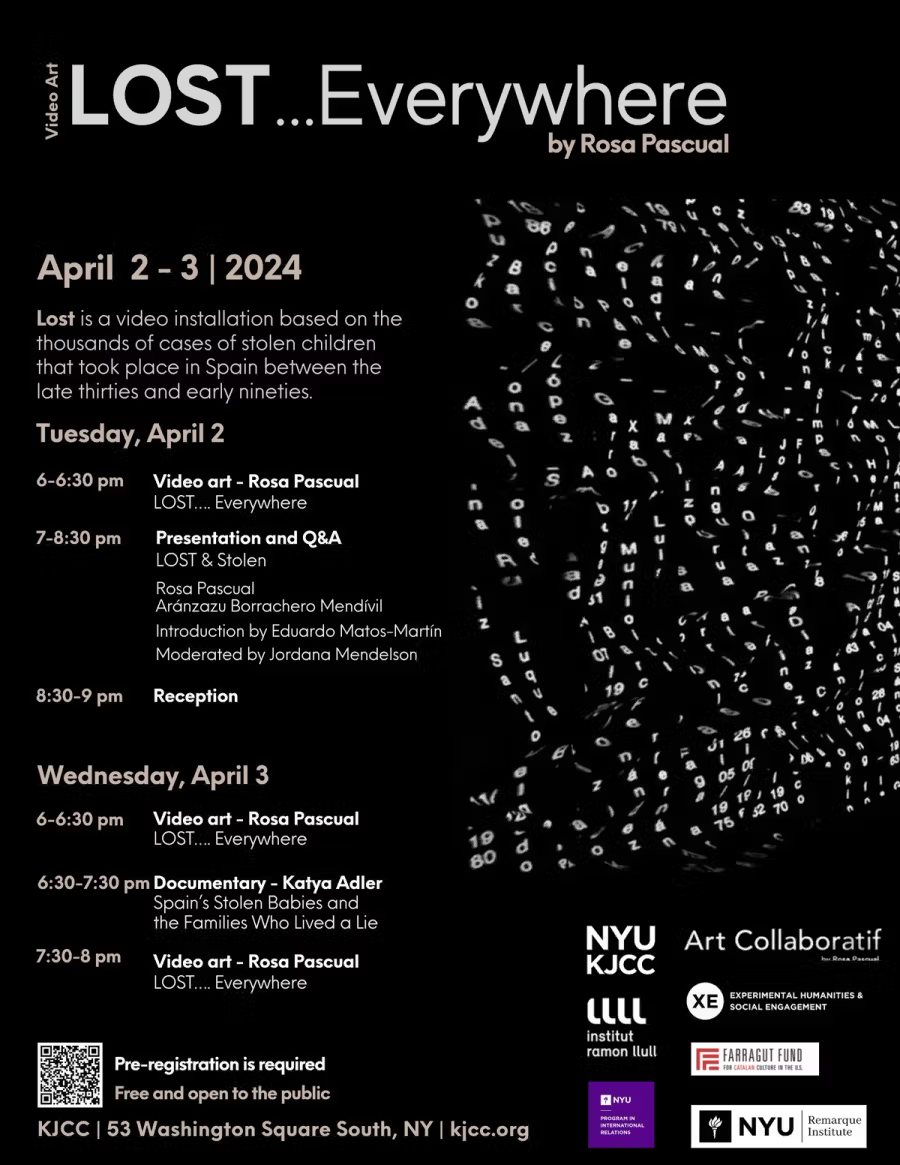Event | Film
LOST…Everywhere: A two-day program
Venue: KJCC Auditorium • 53 Washington Square South
RSVP required

LOST… Everywhere - Video Art by Rosa Pascual
Children, mothers and siblings looking for one another, others not knowing they exist or believed to be dead, and others that will never be able to find one another. Thousands of cases of stolen children in Spain took place between the late thirties and early nineties. Newborn babies were stolen from single or undesirable mothers. They were told that their babies were dead, while being sold to pro-Franco Regime ‘model’ or favorable families.
All this was organized and run by the Catholic Church, a network of private and public hospitals, maternity wards, and the Franco Regime. There is a legal battle with the Ministry of Justice in the Spanish Government to unseal and allow access to files. Fake birth and death certificates, fake funerals and burials were produced, and no possibility of tracing back any biological mother by erasing their names from any register. All in the name of law and social welfare.
Lost is a video installation based on this theme. The observed data shows full names and dates of birth from Spanish Stolen Children that have provided their details, as well as mothers and other relatives searching for the “dead babies” and the presumed date of death or disappearance they were given. All is coordinated by National organizations that are dealing with victims and possible matches via a DNA bank.
LOST EVERYWHERE
While Spanish Stolen Babies are worldwide spread, similar situations have been and are still occurring at an International level. Also through the Catholic Church, there are the well known Irish cases and in the United Kingdom, and by the Protestant and Anglican Church, where single pregnant mothers were enclosed and imposed forced labor; and once they gave birth, told their babies were “missing” and secretly given to so-called “proper” families. From the sixties to the eighties in Germany, we find DDR political cleansing adoption irregularities from communist mothers to the Republic as well as in Cambodia from intellectuals to farmers. In Australia, there were numerous and also forced adoptions for ethnic cleansing purposes.
Other countries like Russia where both pregnant mothers and their unwanted children are, these days, abused in the orphanages they stay. And one of the most incredible cases is in the US, where adopted child exchange is legal in the majority of states for parents that are not happy with their “purchase”. Another relatively recent and poignant irregularity in the US with its southern neighbor Mexico, is the caging of children at the border. Notwithstanding Mexico has its own adoption irregularity with an annually 33.000 presumed homeless children as well as Spanish Stolen Babies.
Bios
Rosa Pascual
Pascual is a socially engaged multidisciplinary visual artist and creative director for arts and cultural organizations. Also funded Art Collaboratif, a platform focusing on collaborating with other art forms and artists as well as other disciplines such as neuroscience, psychology, politics and social justice.
Her work is conceptual and visually based due to her photography, media studies, and theater design background; with a high interest in space, movement, and sound. Her work ranges from installations, to video and life performance.
Aránzazu Borrachero Mendívil
Borrachero Mendívil is a researcher, professor, and activist on collective memory of the Francoist dictatorship in Spain (1936-1975). With Alejandro Peña and Juan Francisco Onielfa, she has been working since 2012 on a digital memory archive, Mujer y Memoria (Women and Memory), designed to house collective memory projects with a gender perspective. With photographer Pedro Lange-Churión, she has co-curated a multimedia exhibition, Duerma en ti (Valencia, 2019; Madrid, 2022; Pamplona, 2022-2023), on the crime of the forced disappearance of newborns and minors during the dictatorship and first years of democracy in Spain.